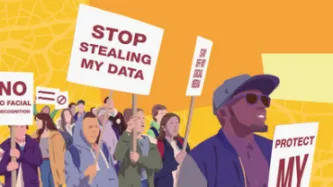Search
Content type: Advocacy
In this submission, Privacy International aims to provide the Office of the UN High Commissioner for Human Rights with information on how surveillance technologies are affecting the right to peaceful protests in new and often unregulated ways.
Based on Privacy International’s research, we provide observations, regarding the following:
the relationship between peaceful protests and the right to privacy;
the impact of new surveillance technologies in the context of peaceful protests…
Content type: News & Analysis
Citing inaccuracy, major manufacturer declines to combine facial recognition and body worn cameras - but accurate or not, real-time facial recognition should never be coupled with police body-worn cameras
Axon Enterprise Inc.—a major manufacturer of police body-worn cameras and digital evidence management systems that also partners with Microsoft to provide services to law enforcement—announced that the company would refrain from equipping police body-worn cameras with facial…
Content type: Long Read
Imagine that every time you want to attend a march, religious event, political meeting, protest, or public rally, you must share deeply personal information with police and intelligence agencies, even when they have no reason to suspect you of wrongdoing.
First, you need to go to the police to register; have your photo taken for a biometric database; share the contacts of your family, friends, and colleagues; disclose your finances, health records, lifestyle choices, relationship status, and…


